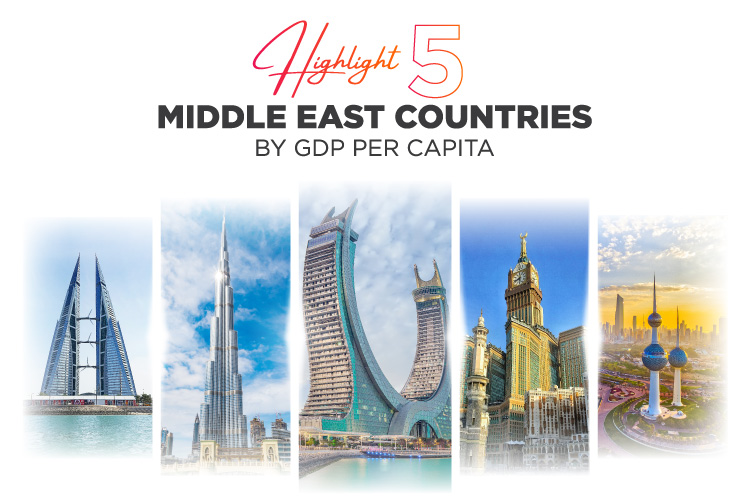The Middle East, a region known for its strategic geopolitical importance and vast oil reserves, presents a complex and diverse economic landscape. In this comprehensive article, we give you a bird's eye view of the economy of the Middle East.
Economy of the Middle East at the glance
The Middle East’s economy is predominantly known for its heavy reliance on petroleum and natural gas industries. Countries like Saudi Arabia, the United Arab Emirates (UAE), and Qatar derive a substantial portion of their revenue from oil exports. However, the economic landscape is changing. There is a growing shift towards diversification, with sectors such as tourism, finance, and technology gaining prominence. This shift is largely driven by the need to mitigate the risks associated with oil market volatility and to create more sustainable and stable economic conditions.

Economy of the Middle East at the glance
Top 5 the best economies in the Middle East
Several Middle Eastern countries have demonstrated remarkable economic resilience and growth, making them standout performers in the region. The largest economies in MENA, based on IMF’s October 2023 data, showcase a diverse economic landscape. Below are top 5 the best economies in the Middle East:
- Saudi Arabia ($1,070 billion GDP): Saudi Arabia remains a dominant economic force in the Middle East with its comprehensive Vision 2030 strategy aimed at diversifying the economy beyond oil. The country has seen steady non-oil growth and is investing heavily in sectors like artificial intelligence and sustainability.
- United Arab Emirates ($509.18 billion GDP): The UAE's economy is one of the most diversified in the Gulf region, with major investments in infrastructure, healthcare, and education. Its dedication to sustainable growth is emphasized in the "We the UAE 2031" strategy.
- Israel ($521.69 billion GDP): Israel's economy is dynamic and innovation-driven, specializing in high-tech sectors such as aerospace, telecommunications, and medical devices. The discovery of significant natural gas fields has also enhanced its economic stature.
- Iraq ($254.99 billion GDP): Despite its reliance on oil, which constitutes a significant portion of its GDP and government revenue, Iraq is looking to expand its non-oil industries, including textiles and construction materials.
- Qatar ($235.5 billion GDP): Qatar boasts one of the highest GDP per capita in the world and is focusing on diversifying its economy beyond natural gas and petroleum. The country is enhancing other sectors like ship repair and cement, while continuing to be a significant player in the global energy market.
Positive features economic development in the Middle East situation
Economic development in the Middle East has been uneven, with oil-rich countries experiencing substantial growth while others face various challenges such as political instability and limited natural resources. Nevertheless, there are several positive trends:
- Economic Diversification: Countries are actively seeking to broaden their economic base.
- Technology and Innovation: There is a growing focus on fostering innovation, particularly in countries like Israel and the UAE, where technology drives economic growth and competitiveness on a global scale.
- Public Sector Reforms: Many countries are reforming public sectors to enhance efficiency and transparency, aiming to attract foreign investment and improve governance.
Highlight 5 Middle East Countries by GDP per Capita
GDP per capita is a critical metric in understanding the economic status and living standards of a country. In the Middle East, this indicator varies significantly, reflecting the diverse economic landscapes across the region. Here’s a look at how different rank of Middle East countries by GDP per Capita, highlighting their economic disparities and underlying strengths.

Middle East Countries by GDP per Capita
- Qatar: Often leading the Middle East and even globally in terms of GDP per capita, Qatar's economy is heavily bolstered by its vast natural gas reserves. The nation's strategic investments in non-energy sectors are also set to enhance its economic profile further.
- United Arab Emirates (UAE): The UAE has one of the highest GDP per capita in the region, thanks to its successful diversification efforts. The country has reduced its reliance on oil and has robust growth in sectors like tourism, real estate, and finance.
- Saudi Arabia: As the largest economy in the region, Saudi Arabia's GDP per capita is significant, supported by its expansive oil wealth. The nation is currently undergoing major economic reforms under its Vision 2030 program to diversify its economy and boost other sectors such as tourism and entertainment.
- Kuwait: With considerable oil reserves, Kuwait maintains a high GDP per capita. The government is attempting to reduce economic dependence on oil by investing in healthcare, education, and renewable energy.
- Bahrain: Although smaller in comparison to its neighboring Gulf states, Bahrain enjoys a relatively high GDP per capita. The country has made considerable strides in banking and finance, and it is increasingly focusing on information technology and tourism to diversify its economy.
Conclusion
The Middle East's economy is multifaceted, with each country exhibiting unique strengths and challenges. As the region continues to diversify its economic bases and invest in human capital and technology, it holds substantial potential for sustainable growth and development. Understanding the economic dynamics of the Middle East is essential for businesses and investors looking to engage with this vibrant region.

